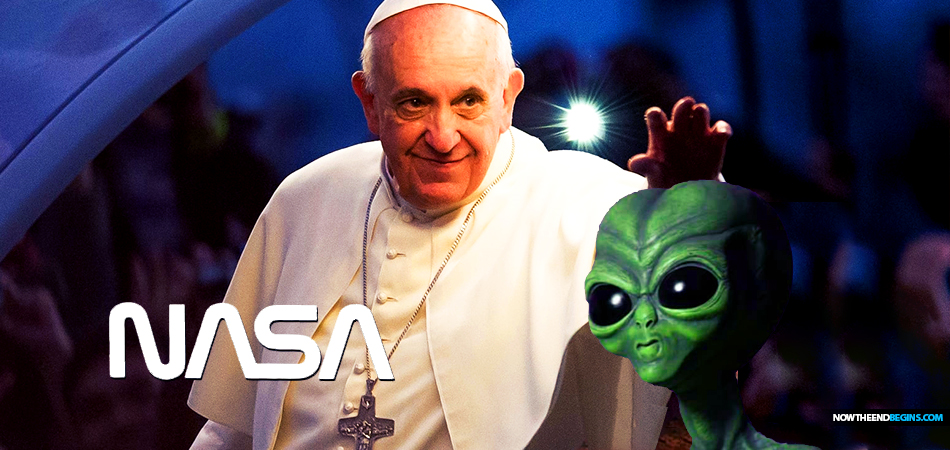
NASA is looking to priests and theologians for help with assessing how humans will react if alien life is found on other planets and how the discovery could impact our ideas of gods and creation.
If I wanted to prepare myself for alien contact, the last people I would turn to would be any priest, rabbi, imam or Greek and Hebrew scholar, as the combined brain power of all of those people wouldn't get you enough wattage to make a 40-watt lightbulb glow. No sir, that won't get the job done. If you want to know how to prepare for alien contact, you need to find yourself a King James Bible believer who could show you a few things about fallen angels having sex with human women, creating hybrid monsters who became the Genesis 6 giants. Then a quick trip to Ecclesiastes 1:9 and Matthew 24:37 to 'seal the deal' and you're all set. Let's see a priest do something with that, ha!
"And it came to pass, when men began to multiply on the face of the earth, and daughters were born unto them, That the sons of God saw the daughters of men that they were fair; and they took them wives of all which they chose. There were giants in the earth in those days; and also after that, when the sons of God came in unto the daughters of men, and they bare children to them, the same became mighty men which were of old, men of renown." Genesis 6:1,2,4 (KJB)
Some of the most illiterate people on the face of this earth when it comes to understanding the Bible are priests, rabbis and Greek and Hebrew scholars. In my entire life, I have never met any of those people who could talk about actual Bible doctrine intelligently for more than 5 minutes. But having NASA turn to them for advice on how best to prepare humans for fallen angel contact is just about perfect when you remember that the very first warning Jesus gives about the end times is " Take heed that no man deceive you". The Vatican has been talking about alien contact for quite sometime now, as they look out into space through a telescope named 'Lucifer'.
NASA is hiring 24 theologians to take part in its program the Center for Theological Inquiry (CTI) at Princeton University
FROM THE DAILY MAIL UK: NASA is hiring 24 theologians to take part in its program at the Center of Theological Inquiry (CTI) at Princeton University in New Jersey, which NASA gave a $1.1 million grant to in 2014. CTI is described as building 'bridges of under understanding by convening theologians, scientists, scholars, and policymakers to think together - and inform public thinking - on global concerns.'
The program aims to answer questions that have baffled us since the begging of time such as what is life? What does it mean to be alive? Where do we draw the line between the human and the alien? What are the possibilities for sentient life in other places?
Now that NASA has two rovers on Mars, several probes orbiting Jupiter and Saturn and is set to launch the James Web Telescope tomorrow that study galaxy, star and planet formation in the universe, it seems that the agency is hopeful it is on the right path to discovering life outside of Earth. And it needs a little help from above to help those of us living below to understand if that happens.
The Rev Dr Andrew Davison, a priest and theologian at the University of Cambridge with a doctorate in biochemistry from Oxford, is among 24 theologians, The Times reports.
'Religious traditions would be an important feature in how humanity would work through any such confirmation of life elsewhere,' Davidson shared in a blog post on the University of Cambridge site. 'Because of that, it features as part of NASA's ongoing aim to support work on 'the societal implications of astrobiology', working with various partner organizations, including the Center of Theological Inquiry at Princeton.'
Davison is set to publish a book next year, titled Astrobiology and Christian Doctrine, which notes he believes we are getting closer to finding life on other planets.
Davison's book notes: 'The headline findings are that adherents of a range of religious traditions report that they can take the idea in their stride.
'Non-religious people also seem to overestimate the challenges that religious people . . . would experience if faced with evidence of alien life.'
Studies and surveys have shown that US Christians are less likely to believe life exists on other planets, but Davison is not the only 'believer' who does not think the idea of extraterrestrials is impossible. Duilia de Mello, an astronomer and physics professor at Catholic University, said she has several seminarians in her classes who often bring up theoretical questions about intelligent life in the universe.
'If we are the products of creation, why couldn't we have life evolving in other planets as well? There's nothing that says otherwise,' de Mello told The Washington Post in August.
In 2008, the Vatican's chief astronomer says there is no conflict between believing in God and in the possibility of 'extraterrestrial brothers' perhaps more evolved than humans.
'In my opinion this possibility (of life on other planets) exists,' said Rev. Jose Gabriel Funes, a 45-year-old Jesuit priest who is head of the Vatican Observatory and a scientific adviser to Pope Benedict. READ MORE
No comments:
Post a Comment